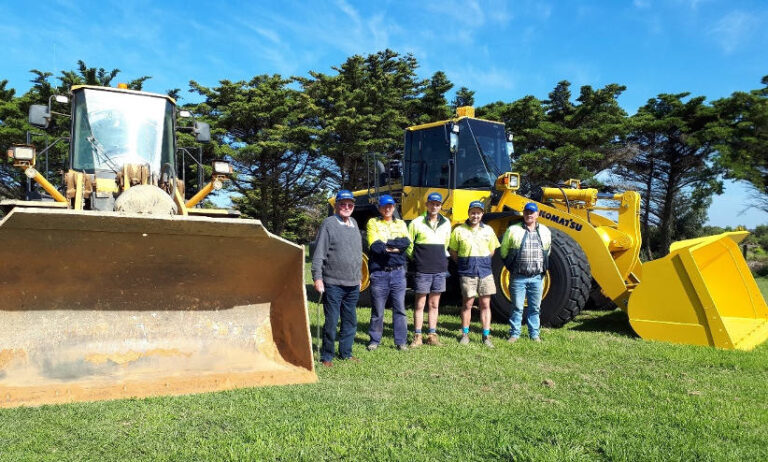Menheere Bros has been operating the Ocean Grove quarry – the last remaining on the Bellarine Peninsula – for nearly 40 years and director Mark Menheere said the family-run business has relied on Komatsu loaders across generations.
“My father, Lofty, started the business nearly 60 years ago. He ran it when I was a boy and I had my go at it as managing director for 30-odd years before stepping down,” said Mark. “Now my eldest boy, Matt, is running the show at our quarry and my other son, Ryan, runs the earthmoving side of things.
“Dad is a Dutch immigrant who was in the army and also a truck driver. He decided he wanted to come and have a go in Australia and started his business.
“I can remember in the early days he had a couple of single-axle trucks which would be five or six cubic yards by the old imperial measurement. He didn’t have his own loader then and would sometimes have to load his truck by hand with a shovel, doing so two or three times a day. Now he comes down to the quarry and sees the latest Komatsu WA380-6 Wheel Loader in action, which goes to show much things have changed just in his lifetime.”
Indeed, the business has gone from shovel, to state-of-the-art.
The manner in which Menheere Bros adopted machinery to work more productively started with Lofty Menheere and continues to this day. “His first loader was a Fordson and was cable-operated, no hydraulics,” says Mark. “That was a big thing for the business. Then he bought a Hough loader – Hough later being acquired by Komatsu – before switching to Komatsu proper about 30 years ago with his first WA250 wheel loader. We put 13,000 hours on that before selling it. Considering how long we’d had it and the amount of work it had done, we got a really good price for it. That’s one of the reasons we’ve stuck with Komatsu loaders, ever since.”
Another key reason is reliability, which has been proven across generations Menheeres. “We’ve had a great run with our W380 loaders,” Mark says. “We bought one which now has about 14,500 hours on it and remains in our fleet as a back-up machine to the new one we bought recently.
“They have been really reliable, which is a huge factor. If you’re in the quarry and you can’t load out because of a break-down or fault, you’re in real trouble.”
Mark Menheere said he recalls any such occasions more readily than when his equipment has saved the day. “You don’t so much remember the times when things have gone right as much as when they go wrong. If you had to recall sometimes that a machine has let you down, well, you do remember those. Luckily, with our Komatsu loaders, 99 percent of the time they just start up and away you go. We’ve actually come to take that for granted.”
When it came time for a new wheel loader, Mark’s son, Matt Menheere, who has taken the business’ reins as director, knew exactly what he wanted. “I was confident in another WA380-6 Wheel Loader because we’d had such a good run with the previous one,” said Matt Menheere. “Nothing much went wrong with it, at all, for a good 12 to 13 years – I think there was a little solenoid problem that Komatsu got right to the bottom of and repaired straight away – so there was no need to change.
“We’ve been really happy with the later model. There aren’t huge differences between it and our older model, but it has more power and is more efficient. It rides more smoothly and is more comfortable.”
Matt Menheere also specified his WA380 to have on-board scales and an auto grease system. “We had the same on our other 380 and it makes a difference to our operations. The scales allow us to meet changing responsibilities for loading and measuring, both from a sales perspective and for occupational health and safety. And the auto-greaser is handy because it’s time-efficient, providing for weekly rather than daily preventative maintenance.”
With Menheere Bros’ Komatsu loyalty firmly entrenched, could Matt envisage changing brands? “No, we were happy with our old ones, we’re happy with our latest one and we expect to be happy when rolling over our Komatsu loaders in the future.
“We keep an eye on the market and do some research, but we don’t see value in going to cheaper brands. A reliable machine can save you a lot of money. Conversely, you don’t want to be repairing expensive machinery and facing production loss. It’s the old adage: “The poor man pays twice” – if you buy a cheap machine that breaks down it very quickly becomes an expensive one.”







